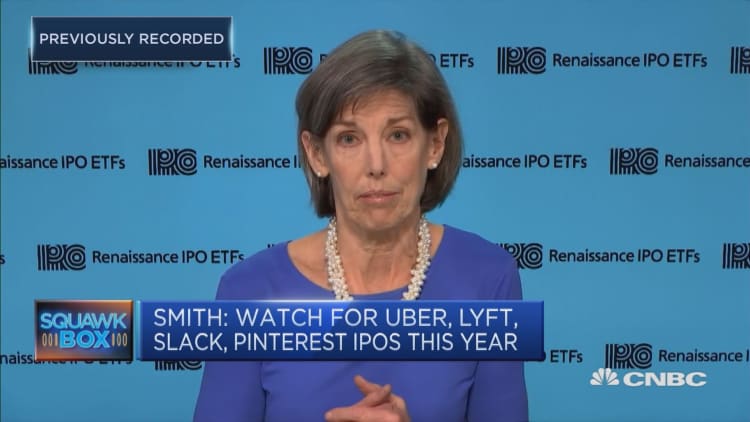
Now that the IPO market has reopened, traders are hopeful that an enormous pile of new stock offerings can be pushed through the door in 2019.
IPO observers are optimistic, and with some justification: There is an outside chance 2019 could be an all-time record for initial public offerings, passing even the legendary 1999 and 2000 years.
But for that to happen, a lot of things need to go almost perfectly. There can't be any more government shutdowns, market conditions have to exhibit low volatility and — most importantly — the public needs to have an appetite to buy very large IPOs at (potentially) very inflated prices.
That's a very tall order.
How big is the IPO market in 2019? Really big.
Renaissance Capital, which advises institutional buyers on IPOs and maintains the IPO ETF, a basket of roughly the last 60 large IPOs, has a watch list of 226 private companies that are planning to go public in 2019. These companies represent a value of $697 billion.
Assuming the companies float 15 percent of their value, you get over $100 billion in IPO offerings ($697 billion x 15 percent = $104.55 billion).
"That will break any record we have ever seen in terms of dollar volume," Kathleen Smith of Renaissance tells CNBC. It would be bigger than 1999 and 2000, the years that represented the height of the dot-com IPO boom. There were $93 billion of IPOs in 1999 and $97 billion in 2000, according to Renaissance Capital.
The market has never gotten close to $100 billion in capital raised in a single year since then. In 2014, the total value raised was $85 billion, but $22 billion of that was for Alibaba, the Chinese e-commerce giant.
In terms of deals lined up for this year, of the 226 companies set to launch there are 119 companies that would be classified as "unicorns," or private companies with valuations over $1 billion. This group includes well-known names like Uber, WeWork and Lyft.
Big IPOs waiting in the wings
(estimated valuations)
Uber $76 billion
GE Health Care $65 billion
WeWork $47 billion
Palantir $41 billion
Airbnb $31 billion
Lyft $15 billion
Source: Renaissance Capital
Renaissance admits the estimate may be conservative. The valuations are based on the last round of private funding. In a normal market, a company would try to go public at a higher level than its last private round.
That's the good news. The bad news is it's not clear who is going to buy all this stock.
"The issue is the capacity of the buy side to absorb all this issuance," Smith said. "The constituency of IPO investors today are fewer and more institutional than they were in 1999-2000 when many individuals and small funds were active stock investors."
The Wall Street banks that arrange IPOs seem quite confident they can pull off a big 2019, one that will equal or exceed the activity in 2018.
That's according to the results of the 2019 BDO IPO Outlook Survey released Monday. BDO polled 100 capital markets executives working at investment banks in December 2018. Nearly half of them (42 percent) expect activity to increase, while 29 percent expect it to stay the same as last year and 29 percent expect it to decrease.
One important point from the survey is that if the price is not right, the survey participants made it clear that there were alternatives to going public. In fact, an IPO seems to be fairly far down on their wish list of possible exit strategies for these private companies.
About 53 percent of the 100 U.S. tech CFOs surveyed in BDO's Technology Outlook Survey believe that pursuing M&A will be the most popular "exit strategy" or choice, followed by remaining private over going public (25 percent), having an IPO in the U.S. (14 percent) or an IPO in a foreign market (8 percent).
Renaissance's Smith — who is a buyer of IPOs — is excited about all the well-known companies that may attempt an IPO in 2019. "Seems like a buyers market to me, when there is so much choice of product."


